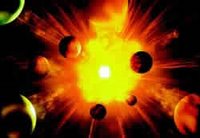
Scientists have announced that the universe grew from “the size of a marble” to “astronomical proportions” in a trillionth of a second after the big bang, 14 billion years ago.
It is a deduction from examination of the cosmic radiation background, which is supposedly the afterglow of the big bang.
I can’t tell if the scientists who make such statements are just trying to “dumb down” the physics for popular consumption, or if they really are that dumb. Announcements like that are paradoxical and incomprehensible.
If the entire universe, everything that exists, was “the size of a marble,” what does that mean? A marble compared to what? Who would be looking at it?
Are we invited to imagine that we were floating outside the universe, (which is impossible, since the universe is everything), looking down on this cute little marble sized universe (again impossible), and we watch it explode to incomprehensible size in an incomprehensible ins tant?
tant?
Only God could exist outside the universe like that. So the scientists are saying, in effect, “Imagine you are God, beyond all that exists.” And I’m supposed to say, “Okay, no problem.” Because it is utter nonsense to imagine that a human being could have a point of view, even in imagination, beyond all that exists. How would we know what it's like to be God?
Also, after the explosion we have to change our mental image and get back inside the universe somehow, in order to avoid being stranded outside the expanded universe, a lonesome transcendent God instead of an existent human being.
Scientists who think they are describing reality with their equations have become blind to their own humanity, so they don’t see the irony in their Godlike pronouncements.
 The big bang is a mathematical singularity, an artifact of the equations that physicists use. It’s like starting with a hundred jellybeans and each day eating one. As soon as you understand that process, you realize that a hundred days from now, you will have zero jellybeans. It’s a mathematical result, an artifact of the human mind. It does not mean that today’s jellybeans do not exist because in a hundred days they will be gone.
The big bang is a mathematical singularity, an artifact of the equations that physicists use. It’s like starting with a hundred jellybeans and each day eating one. As soon as you understand that process, you realize that a hundred days from now, you will have zero jellybeans. It’s a mathematical result, an artifact of the human mind. It does not mean that today’s jellybeans do not exist because in a hundred days they will be gone.
In the same way, running an equation backward in time instead of into the future, it is an error in reasoning to say that today’s universe was once the size of a marble.

 anyhow with front and side airbags. Why not go all the way with the concept? Airbags inflated everywhere except the bottom and the front window. Forget the sheet metal entirely. It would be a very light vehicle and get high fuel economy. If you hit anything, or got hit, you would just bounce. It worked for the Mars explorer. It could work on the highway.
anyhow with front and side airbags. Why not go all the way with the concept? Airbags inflated everywhere except the bottom and the front window. Forget the sheet metal entirely. It would be a very light vehicle and get high fuel economy. If you hit anything, or got hit, you would just bounce. It worked for the Mars explorer. It could work on the highway.











